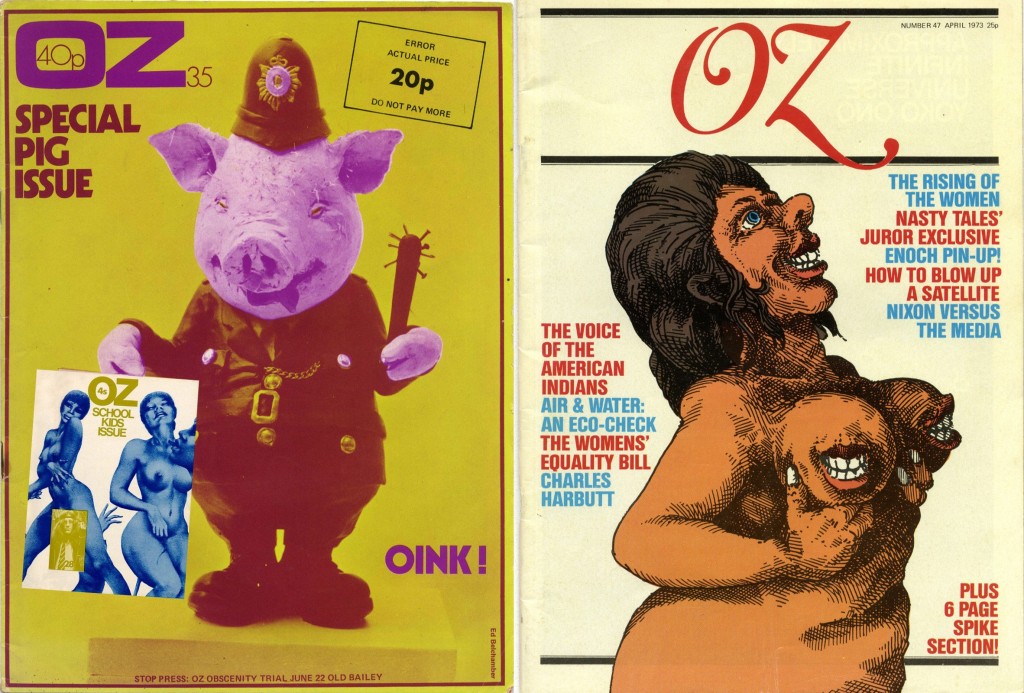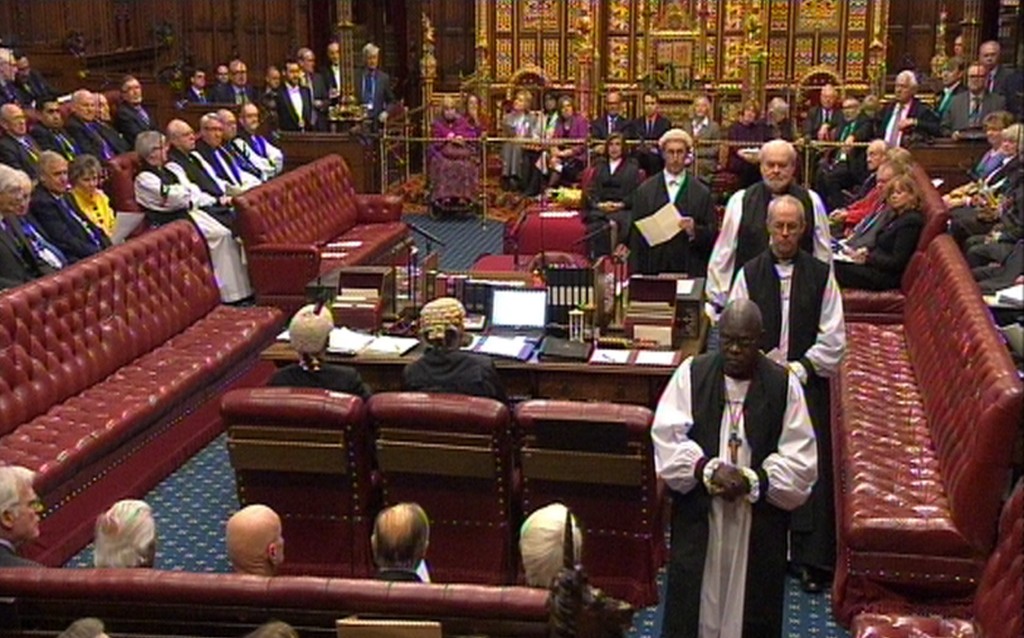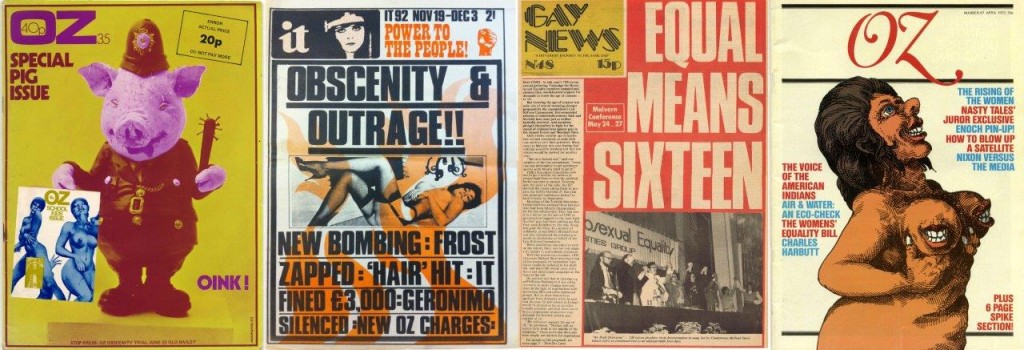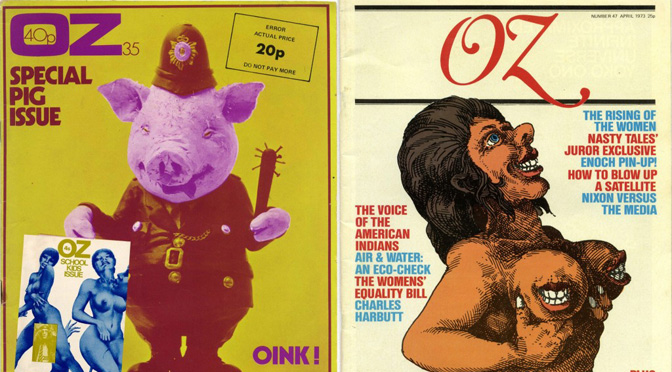
Sexual Rights Are the Lord’s Undoing
Without the European Court of Human Rights, the United Kingdom has been left to the mercy of the House of Lords – now the Supreme Court of the UK – to pass judgements on sexual matters. In the light of recent threats to the Human Rights Act, Garry Otton looks at the dog’s breakfast the Law Lords made of it.
It is people; not politics or the courts that define sexual behaviour. The lines are increasingly blurred as sex is tapped from an expanding list of options off a free phone-app. Nonetheless, the extent we legislate and seek to control sexual passion continues unabated, clumsily administered by an elderly and inexperienced judiciary as embarrassing as your mum bursting into your bedroom to find you in a threeway. I’m reminded of the judge in the notorious Oz magazine morality trial who discounted the testimony of bohemian jazz musician George Melly because he heard he had sworn in front of his children and had used the word ‘cunnilingus’ in court. But more of that later…
It was in 1727 when Edmund Curll was convicted of ‘disturbing the King’s peace’ for publishing the anti-clerical erotic fiction, Vénus dans le Cloître, ou La Religieuse en Chemise or Venus in the Cloister or The Nun in her Smock, the story of the seduction of 16-year-old Sister Agnès by 19-year-old Sister Angélique. And it continued to disturb the peace when it became the basis of the Obscene Publications Act 1959. Penguin Books and D.H. Lawrence’s Lady Chatterley’s Lover survived the moral cull in 1960 only through having ‘literary merit’. We’ve gone much further by making it not just illegal to publish ‘extreme pornographic material’ but also a crime to possess it following the introduction of Section 63 of the Criminal Justice and Immigration Act 2008. Further efforts to confine and control sexual expression are manifest in such laws as the Indecent Displays Act 1981 which require most adult stores to ensure their windows are blacked out, that none of their goods are seen if the door is open and warning signs are erected over the entrance.
In 1998, the UK incorporated the European Convention, and the guarantee of freedom of expression it contained in Article 10, into its domestic law under the Human Rights Act.
As the walls crumble to create an age of greater sexual freedom, one political party after another fall over themselves to loudly proclaim their contributions and impeccable record on lesbian, gay, bisexual and transgender rights. In truth, the lgbt community owe more to the European Court of Human Rights than any one political party on a whole host of progressive measures including decriminalising same-sex consensual activity; barring discrimination against transgender individuals in employment; equalising the age of consent; enabling lesbian, gay and bisexual people to serve openly in the military; allowing transgendered people the right to marry, have pension rights and to enjoy employment equality.
Since up until only 15 years ago there was no protection against discrimination on the basis of sexual orientation in public or private employment, perhaps our UK parliament is not quite the great example of democracy our state broadcaster and media like to think it is.
The Law Lords carried out the judicial work of the House of Lords, the highest appeal court, until 2009. The Supreme Court of the UK then assumed jurisdiction on points of law for all civil law cases and some human rights issues in the UK and all criminal cases in England, Wales and Northern Ireland.
The purpose of the House of Lords is to make laws, hold the Government to account and provide a forum of independent expertise. Sitting at the very front of the House of Lords is the ‘Bishop’s Bench’. It consists of 26 unelected bishops of the established Church of England. Not the Church in Wales or Protestant Church in Northern Ireland as they are disestablished. And not the Church of Scotland as they have ministers, not lords. And not the Catholic Church, of course, which is what Her Majesty the Queen in her title as Defender of the (Church of England) Faith is supposed to be defending us all from.
DECRIMINALISATION OF HOMOSEXUALITY
In 1967, after a lengthy debate in the House of Commons, homosexuality was partly decriminalised by the Sexual Offences Act. After it was passed, Lord Arran, who helped steer the Act through parliament, reminded gays not to ‘flaunt’ the victory and to bear their cross ‘modestly and quietly’. All the same, a new generation of stroppy queens went on to flaunt themselves magnificently’ paving the way for full emancipation in the future. It was never just gentle discussions and polite political campaigns that would change minds.
The process took much longer in Scotland where homosexuality wasn’t decriminalised until 1981, the same year lgbt people scored their first victory in the ECHR after Belfast shipping clerk Jeff Dudgeon was interrogated for his sexual activities by the Royal Ulster Constabulary. Dudgeon vs UK found in Jeff Dudgeon’s favour. It was then only a matter of having to drag a cartel of extreme Christian MPs from Northern Ireland kicking and screaming into decriminalising homosexuality the following year.
The Sexual Offensive Act only made it easier to prosecute gay men. It legalised the extraordinary situation where it would be illegal to introduce two men to each other to indulge in a sexual act that was now legal! In the limited decriminalisation of homosexual acts, three conditions had to be fulfilled: –
- The sex act had to be consensual.
- The sex act could only involve adults of 21-years-old and over. (The age of consent for everyone else (except lesbians who were excluded), was 16).
- The sex act had to take place in private. The courts went on to rule what the term “private” actually meant. Court judgments declared it meant only two people, that sex taking place in a hotel was not private and neither was a privately owned home if a third person was present, even if that person was in a different room!

AGE OF CONSENT
In 1993, with no age of consent for lesbians, 16 for everyone else and 21 for gay men, Stonewall marched three young men, Ralph Wilde, Will Parry and Hugo Greenhalgh, who were all 18, to Strasbourg to take Britain to the ECHR claiming that the unequal age of consent was a breach of the young men’s privacy. In the face of almost certain defeat, Prime Minister John Major – lampooned on Spitting Image as a grey man who ate dinner with his wife in silence, occasionally saying “nice peas, dear” – allowed a free vote on this supposedly contentious moral issue in the Criminal and Public Order bill. His former mistress, Edwina Currie MP, a backbench MP, moved the amendment. It lost by 14 votes but the age of consent was reduced to 18 for gay men, leading to a second challenge to the ECHR, Sutherland vs UK, after 16-year-old Euan Sutherland led a delegation of agony aunts to protest at the door of 10 Downing Street. Euan’s case was heard by the Commission of the ECHR in 1996 and the court held that the unequal age of consent was indeed a breach of his human rights. Stonewall launched another case, that of 16-year-old, Chris Morris.
In 1997 a Labour government was elected and they undertook to introduce legislation in Parliament to create an equal age of consent, so the final hearing of Euan and Chris’s cases were stayed while there was much wringing of liver-spotted hands in Parliament as MPs tried to resolve the issue.
The following year, in 1998, Ann Keene MP moved an amendment to equalise the age of consent in the Crime and Disorder bill. It was passed in the Commons but defeated in the Lords where it was blocked by an alliance of hereditary peers led by Lady Janet ‘tin knickers’ Young, famous for her love of rugby, cricket, white shirts and Christian ‘family values’.
In 1999 the Government introduced a Sexual Offences (Amendment) bill equalising the age of consent. Again this was passed in the Commons, but defeated in the Lords under loud protestations that they were protecting children.
In 2000 the Government then decided to use the Parliament Act to push the Sexual Offences bill through the Lords enabling an equal age of consent to become law in 2001. This time, lesbians were included, while in Scotland, the Scottish Parliament voted for an equal age of consent and agreed that the Westminster bill should extend to Scotland.
As in all of the bills and acts introduced by Parliament on sex, the language was forbidding and condemning. The Sexual Offences Act, introduced in 2004, which swept away all of the previous sex-specific legislation, including the 1967 Act, was no exception.
It wasn’t until 2009 a fiercely pious Northern Ireland caught up and introduced an equal age of consent there too.
MILITARY
‘Decriminalising’ homosexuality in 1967 didn’t include the military as gay sex was thought to ‘undermine morale and fighting capability’, something that certainly didn’t occur in the militaries of ancient Greece. A number of cases were brought to the military courts, including Robert Ely, who was dismissed from the armed services after 17 years’ service when a letter was discovered revealing his sexual orientation. It led, in 1992 to a Tory Select Committee which promised to stop the witch-hunts and criminal prosecutions. But they continued.
This in turn led, in 1994, to policy and guidelines decriminalising homosexuality but still had the Ministry of Defence stressing how it was incompatible with the armed forces. In reality, armed forces personnel could still be administratively discharged.
The tanks seemed to move slightly by 1996 when it took a Ministry of Defence Policy Advisory Team to find that gay and lesbian people were “no less physically capable, brave, dependable and skilled than heterosexuals”, but advised they “must deal with the world as it is” and that “service attitudes, in as much as they differ from those of the general population, emerge from the unique conditions of military life and represent the social and psychological realities”. As such, the report concluded that there was “military risk from a policy change”. That was until sacked air force personnel, Jeanette Smith and naval commander, Duncan Lustig-Prean turned up in 1998. They were joined by Graham Grady and John Beckett in front of judges in the High Court and Court of Appeal who ruled that although it was unfair, they were unable to lift the ban.
It was astonishing that the Government under Prime Minister Tony Blair should have thought it worth continuing to waste taxpayers money defending the UK in the ECHR, but the Ministry of Defence insisted that military service was a special context because the cohesion of a military unit had to withstand “close physical and shared living conditions together with external pressures such as grave danger and war”. The ECHR court thought otherwise and observed: “To the extent that they represent a predisposed bias on the part of a heterosexual majority against a homosexual minority, these negative attitudes cannot, of themselves, be considered by the Court to amount to sufficient justification for the interferences with the applicants’ rights outlined above any more than similar negative attitudes towards those of a different race, origin or colour.”
In 2000, the military ban was lifted.
CHRISTIAN RIGHTS VS GAY RIGHTS
After two centuries of Christianising sexuality, it’s no surprise that Christians emerge on a regular basis with new stories of ‘persecution’ for the courts and media. Registrar, Lilian Ladele was just one of those in 2013 when Christian lawyers took her to the ECHR after she refused to conduct civil partnership ceremonies. She lost. Then there was Gary McFarlane who refused to counsel same sex couples, even though he had joined an organisation he knew supported equal rights. His case was rejected too.
SPANNER TRIAL
Not all cases ending up in Strasbourg involving gay sex resulted in victory, as a group of men arrested, after attending bondage, discipline and sadomasochistic (BDSM) sex parties in 1987 could testify. This was an important case as it raised the question of whether the government or one’s self was justified in controlling one’s own body in private situations where the only harm was to consenting adults.
At a cost approaching £4 million, 43 men were investigated, 16 tried and sentences of up to four-and-a-half years imposed after police followed up on an advert they found in a gay magazine. The home-made video the police obtained had them thinking it was a ‘snuff’ movie with people being killed after they were tortured.
Their search ended in a country house in Shropshire shared by Ian Wilkinson, (56), a forester, and Peter Grindley (41), a care assistant in a home for the mentally handicapped. The officers took dogs with them to help search for bodies buried in the garden but found only a fully-equipped sex room with ‘torture chamber’ in the basement where a variety of single or married men would go and sometimes be filmed having sex.
Such sex play is a good deal less controversial today with a plethora of porn websites and sex apps availing themselves at the click of a keyboard to meet partners with a multitude of sexual interests. Before the smartphone made its way into men’s pockets, finding partners with similar interests was more difficult and a great deal more risky. It was at this time that the subject of caning with leather straps, canes or nettles, piercing, applying heat with hair dryers, cold with ice cubes, hanging ball weights off body parts and shaving the odd slave became one of the most talked about legal battles of the naughty nineties. The charges of actual bodily harm (ABH) came about because there was no legal consent to assault. (Unless you are boxing, playing rugby, a doctor, a tattooist or don’t cause too much harm in a common assault).
The newspapers had a field day when men in horsehair wigs, stockings and fancy shoes sat adjudicating over men in rubber and leather chaps. A London demo saw men pulling pony carts while being gently whipped, marching through the streets clad in kinky leather and rubber wear. S&M clubs flourished like never before.
The Spannermen, including a lay preacher, were prosecuted in 1990. They lost their appeal in the Lords by three to two. In upholding the conviction, Lord Jauncy of Tullichettle feared the contamination of a society from “rather curious activities”. Interestingly, a court of appeal at this time overturned a husband cutting his initials into his wife’s backside with a knife as it was consent in a ‘matrimonial home’ and private, so not a matter for criminal prosecution.
In 1995, two Spannermen and a group of S&M enthusiasts called the ‘Liberty 5’ appealed to the UK courts which declared a person does not have the legal ability to consent to receive an act which will cause serious bodily harm, such as extreme activities of a sadomasochistic nature. They took their case to the ECHR which declared that whilst a person has a general right of free will, a state may as a matter of public policy restrict that in certain cases, for example for the general public good and for the protection of morals.

BLASPHEMY AND GAY NEWS
A case that never made it to the ECHR and perished before the Lords was the Gay News blasphemy case. It was declared inadmissible by the European Commission of Human Rights in 1982. The offending poem in a 1976 edition described a Roman centurion, unable to find words to describe his love for Jesus, kissing him on his lips and wounds before bringing the lifeless Jesus to an orgasm. ‘The Love that Dares to Speak its Name’ was supposed to have been a message about the ‘absolute universalism of God’s love’. Clean up TV Christian campaigner Mrs Mary Whitehouse was not best pleased when she read it and launched a private prosecution against the “blasphemous libel concerning the Christian religion, namely an obscene poem and illustration vilifying Christ in his life and in his crucifixion.” The jury found editor Denis Lemon and Gay News Ltd guilty with the judge advising it was “touch and go” whether or not he would imprison Lemon. Judge Alan King-Hamilton famously interrupted the trial proceedings to announce the cricket scores and declared in his summing-up that he had been inspired by God. More controversially he ruled that the intention behind the publication was inadmissible as a defence, in effect saying no defence was allowed.
CORRUPTING PUBLIC MORALS AND THE INTERNATIONAL TIMES
It was in 1970 that the police raided the offices of ‘underground’ magazine the International Times. The Law Lords found the publishers guilty of ‘conspiracy to corrupt public morals’ for publishing contact advertisements for gay people despite the fact it had been legal for three years. The three directors all received fines and prison sentences. Oz was next…
OBSCENITY AND OZ
After having their offices raided on a number of occasions and worried they were losing young readers in 1970, Oz magazine invited kids to edit an issue. It was the highly sexual Rupert Bear parody that caught the unwelcome attention of the Obscene Publications Squad and set the scene for the obscenity trial of 1971 under a “conspiracy to corrupt public morals” which carried the possibility of a life sentence. The charges read out in the criminal court stated the defendants had conspired with other young persons to produce a magazine “containing obscene, lewd, indecent and sexually perverted articles, cartoons and drawings with intent to debauch and corrupt the morals of children and other young persons and to arouse and implant in their minds lustful and perverted ideas”. The ‘Oz Three’, Richard Neville, Felix Dennis and Jim Anderson were found ‘not guilty’ on the conspiracy charge but convicted and imprisoned on two lesser offences. At the committal hearing the defendants all wore rented schoolgirl outfits and at the appeal trial, long wigs. Although the convictions were overturned, after the verdict they were taken to prison and had their hair forcibly cut. Felix Dennis received a lesser sentence after the judge deemed him “very much less intelligent” than the others. He went on to become one of Britain’s wealthiest publishers. When Judge Argyle repeated his allegations about Dennis in The Spectator, which was outside court privileges, Dennis sued the magazine and won. Asked why he didn’t sue Judge Argyle, he said: “Oh, I don’t want to make him a martyr of the Right: there’s no glory to be had in suing an 80-year-old man and taking his house away from him.”
Garry Otton 2015


Very nice post. I just stumbled upon your weblog and wanted to say that I have really enjoyed surfing around your blog posts. In any case I will be subscribing to your rss feed and I hope you write again very soon!